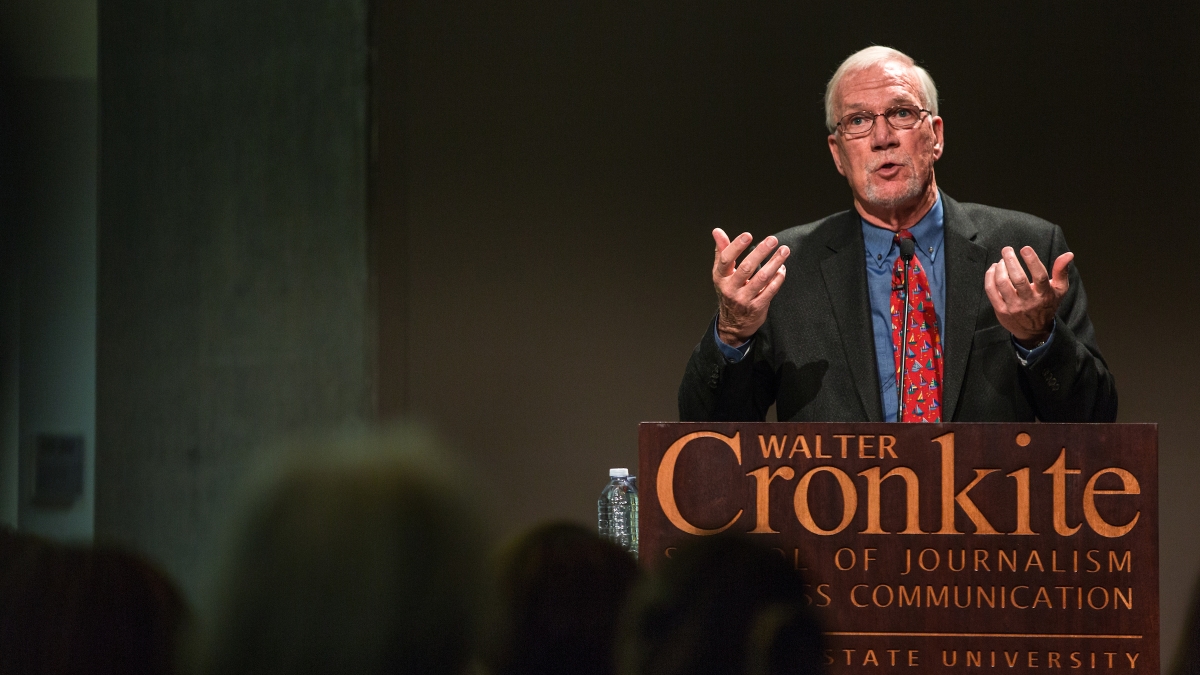Even as President Donald Trump insults and criticizes the media, his administration has been a tonic for investigative journalism, according to the Boston Globe editor who helped to uncover widespread sex abuse by Catholic priests.
“The very person who wants to cast out the watchdogs has awakened them,” said Walter V. Robinson. “And the watchdogs are now barking so loudly that much of the public is astir as well.”
Robinson led the Globe’s Spotlight team, which won the 2003 Pulitzer Prize for Public Service for its work uncovering hundreds of cases of sex abuse by priests and the church’s attempts to hide it. He is currently the Donald W. Reynolds Visiting Professor, teaching investigative journalism to students at the Walter Cronkite School of Journalism and Mass Communication at Arizona State University.
The Globe investigation was made into the movie “Spotlight,” which won the 2015 Academy Awards for Best Picture and Original Screenplay. Actor Michael Keaton portrayed Robinson in the movie.
Robinson was the featured speaker of the 11th annual Paul J. Schatt Memorial Lecture on Monday night at the Cronkite School at the Downtown Phoenix campus.
He said that when “Spotlight” won the Best Picture Oscar a year ago, it was a bright spot for journalists after years of turmoil due to declining revenue, and an “affirming moment” for journalism students.
Then came Trump.
“To the new president, journalists are scum. Not just some of us. All of us.
“This effort to delegitimize journalism is a major imperative of his White House.”
But it’s reinvigorated investigative journalism.
“A man who poses the gravest threat to individual liberties is also paradoxically the tonic we need,” he said.
Trump, at a recent conservative political conference, said “the fake news” is “the enemy of the people.” Later, mainstream outlets including CNN and The New York Times were blocked from a White House briefing. Reporters from Time and The Associated Press boycotted the briefing in protest.
Robinson, meanwhile, said that the term “investigative reporter” can be confusing.
“I was just a reporter who loved to dig out page one stories — stories people didn’t want me to find,” he said, and noted that big stories are everywhere.
“There is no story you’re assigned for tomorrow’s newspaper that doesn’t have buried in the fourth or fifth paragraph a much better story,” he said.
Robinson noted that the Spotlight team’s sex abuse investigation was prompted when the reporter who covered courts wrote about the victims’ lawsuit, and he lamented that many newspapers have been forced to cut back on local reporting.
“Local news organizations are what all of us have depended on for decades to keep us informed on important issues. Matters that aren’t ideological. Reporting that makes sense of what’s going on around us and helps us make intelligent decisions about where to live, what schools are good, how safe we are and whether our tax dollars are wisely spent,” said Robinson, who said that the Boston Globe no longer regularly covers the courts.
He said that in 1999, 25,000 reporters worked at American daily newspapers, while two years ago, that number was 15,000.
“To me, the magnificence of the First Amendment has lost a little of its luster because there are many fewer journalists to exercise the rights it guarantees,” he said.
But he noted that there has been an increase in non-profit investigative journalism and he noted that many news outlets have seen an increase in subscriptions the past few months.
“The public is alarmed and wants more accountable reporting and for the moment at least, they seem willing to pay for it,” he said.
The Cronkite School established the Schatt Lecture series in 2007 in honor of former Arizona Republic reporter, editor and columnist Paul J. Schatt, who taught public affairs reporting to Cronkite students for more than 30 years as an adjunct faculty member. The series in his name is supported by an annual gift from The Arizona Republic and an endowment created in Schatt’s memory by his widow, Laura Schatt-Thede.
Walter Robinson, the current Cronkite School Donald W. Reynolds Visiting Professor, answers a question about the media's role in Donald Trump's election. His "Must See Monday" speech in the First Amendment Forum about the future of democracy and investigative journalism was attended by over 100 people. Photo by Anya Magnuson/ASU Now
More Law, journalism and politics

Recently launched NEWSWELL supports local news outlets to empower communities, transform local news industry
Based out of Arizona State University, a recently launched nonprofit organization is transforming the desert landscape — but perhaps not the desert you’re picturing.NEWSWELL, which publicly launched…

Opportunities and risks of AI in the court system
“Science and innovation have always been an important part of ASU Law.” That's what Stacy Leeds, dean of Arizona State University’s Sandra Day O’Connor College of Law, told a room full of…

Law and addiction: How new science is impacting the justice system
For years, people who struggle with drug addiction have often been considered weak or in need of incarceration by the general public and legal community.But with recent scientific discoveries about…


